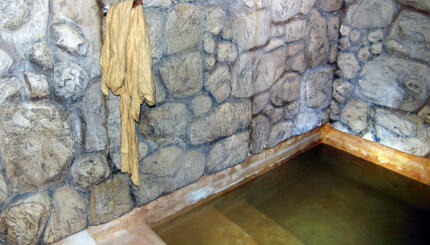In his last posts, Joel Chasnoff, author of The 188th Crybaby Brigade: A Skinny Jewish Kid from Chicago Fights Hezbollah: A Memoir, wrote about the battle over his book cover and meeting Dave Eggers. He is guest-blogging all week for MyJewishLearning and the Jewish Book Council.
One of the biggest challenges I encountered in writing The 188th Crybaby Brigade was the switch from comedy written for the stage to comedy for the page.
I’m a stand-up comic by trade. Onstage, I have tools at my disposal: facial expressions, body language, the ability to speed up and slow down as I create a psychological dialogue with the audience. Best of all, if a particular string of jokes bomb, I can switch topics, or, better yet, pick on a funny looking guy in the guy in the front row.
In writing humorous prose, these tools are, obviously, out the window. Compounding the problem is that I lose my ever-important barometer: instant feedback. I love the instantaneous nature of stand-up comedy. I never have to wonder how the act is going. Instead, it’s simple: if they laugh, I’m great. If the audience is silent, I suck.
To acquaint myself with humor writing, I read books by the three Daves: Sedaris, Eggers, and Barry.
As I read, I looked for patterns. Although their styles of humor differ, I noticed a common trait: they never signaled the joke. Instead, they simply state the absurd truth in as straightforward a manner as possible. This bluntness makes for a double punch: 50% of the humor comes from what the author is saying, and the other half comes from the fact that he’s saying it so bluntly.
For example: one of my favorite passages in Eggers’ A Heartbreaking Work of Staggering Genius is the one in which Eggers describes his night out with friends in a Berkeley, California bar:
Brent and I, and everyone else, are standing on the bar’s second level, looking down upon the heads of the hundred or so below us, while drinking beer that has been brewed on the premises. We know that the beer has been brewed on the premises because, right there, behind the bar, are three huge copper vats, with tubes coming out of them. This is how beer is made.
Whenever I read this passage, I laugh out loud. What makes it so funny is that, instead of waving his arms and signaling the absurdity of the situation (that seeing beer travel through tubes implies that the beer is brewed on the premises), Eggers instead takes the opposite tack: he takes it seriously. His deadpan approach makes the joke doubly funny—much funnier than had he said, “It’s so crazy. They have beer in vats and tubes, as if we’re supposed to believe that this means it was brewed on the premises.â€
In The 188th Crybaby Brigade, I attempt to utilize humor by describing absurd situations as candidly as possible. I start with the opening sentence of the book, in which I chronicle my first medical check-up at the military Induction Center in Tel Aviv:
The Russian is poking my balls.
It’s awkward.
Two chapters later, I describe my first day of basic training:
I am Israeli soldier number 5481287. I’m at the Armored School, in the south, halfway between Jordan and Egypt. I’m dressed like a soldier but I look like a clown. My uniform’s three sizes too big, and it’s stiff, so it looks like I’m wearing a suit of green construction paper; I’d thought I would look sexy in uniform, but I don’t. I’ve also got a new look—I’m buzz-cut and shaved—and a new name: instead of Joel, I’m now my Hebrew name, Yoel, and my last name, according to my dog tags, is Shetznitz.
“You misspelled my name,†I said to the guy working the dog tag machine.
“So don’t die,†he said, and shooed me out the door.
Humor can even be used to describe a situation as dark as death. Here, I talk about the platoon’s field trip to the Yad Vashem Holocaust Museum:
Inside Yad Vashem, it’s the usual Platoon Two, Company B shenanigans. While our tour guide describes Hitler’s rise to power, Gerber pinches Uri in the ass. “Koos-emok!†Uri whispers, then he stuns Gerber with a quick knee to the nuts that sends him tumbling into a display case of Zyklon B.
“Bitch!†whispers Gerber.
“Your mother,†Uri whispers back.
Doni and Tanenbaum step between them, try to break it up, but only get sucked into the melee. Then Ganz jumps in, then Nir, and suddenly six, seven of them are attacking one another with headlocks and noogies, Three Stooges style, next to a wall-size photo of Jewish corpses.
My first thought is to scold my platoon mates. Show some respect! I want to shout. For the sake of the six million dead!  Â
But as I watch my comrades roughhouse, I suddenly have another thought:
This is awesome.
I go on to describe why my platoon mates’ roughhousing in a Holocaust museum is a good thing for the Jewish people—namely, because it means that after thousands of years of persecution, we’ve reached a point in Jewish history where the notion of our people being annihilated is so foreign that Jews can goof around in Yad Vashem.
Typically, a writer doesn’t get the stand-up comedian’s instant feedback. But since you’re reading this and have the ability to post, I’ll go ahead and ask:
Does it work?
Joel Chasnoff’s The 188th Crybaby Brigade: A Skinny Jewish Kid from Chicago Fights Hezbollah: A Memoir is available in bookstores now. Visit Chasnoff’s official website: http://joelchasnoff.com/.


